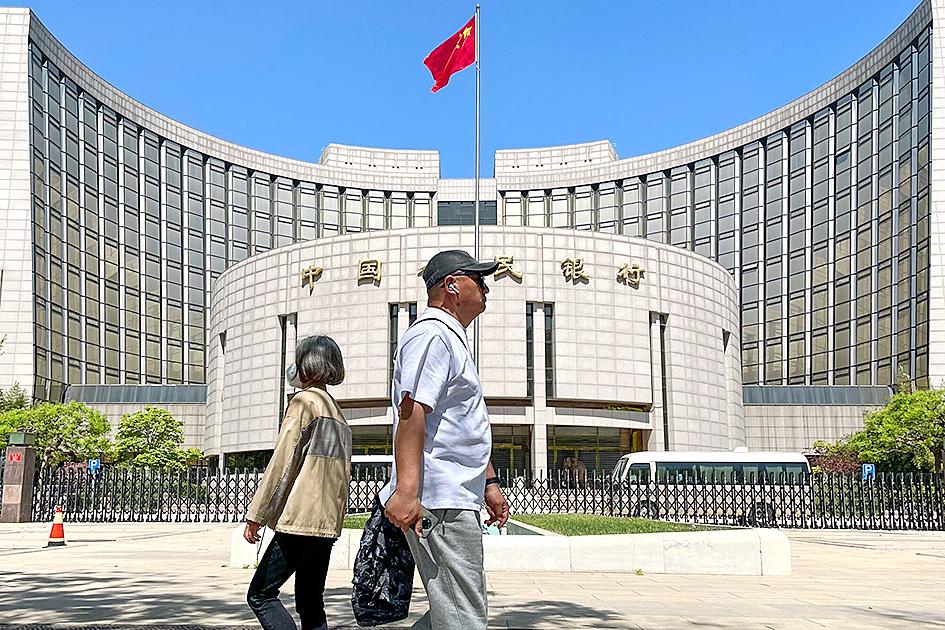Taiwanese companies are cutting their exposure to China just as they ramp up investment in other parts of the world in the latest sign of how growing tensions between the US and China are reshaping global supply chains.
New investments in China by Taiwanese companies declined 10.4 percent year-on-year in the first quarter of the year to US$758 million, data released by the Investment Commission yesterday showed.
That follows an almost 14 percent decrease in such investment last year.

Photo: Bloomberg
Taiwanese companies, traditionally among the biggest investors in China, have been reducing new capital expenditure in the world’s second-largest economy over the past decade. The slowdown has accelerated since former US president Donald Trump began pushing US companies to decouple from China, a policy largely continued by the administration of US President Joe Biden.
In addition to the slowdown in new money, Taiwanese firms pulled a record amount of profit out of China last year, Chinese-language media reported.
Taiwanese-listed companies repatriated NT$114 billion (US$3.72 billion) of investment income from China last year, the Financial Supervisory Commission said in a statement on Tuesday.
The paring back of cross-strait investment comes as China has ratcheted up the political, military and economic pressure on Taiwan since the 2016 election of President Tsai Ing-wen (蔡英文).
China responded to Tsai’s stopover in California early this month — during which she met with US House of Representatives Speaker Kevin McCarthy — with military drills around Taiwan.
Beijing officials have been keen to reverse the trend of Taiwanese firms exiting China.
Wang Huning (王滬寧), the No. 4 official in the Chinese Communist Party, promised greater efforts to persuade Taiwanese businesses to invest in China and to help them integrate into the Chinese economy.
Slowing investment in China stands in contrast to a rapid increase in Taiwanese investment elsewhere.
Total Taiwanese overseas investment, excluding China, surged 240 percent to US$6.9 billion in the first quarter, the Investment Commission data showed, with half of that due to a US$3.5 billion investment by Taiwan Semiconductor Manufacturing Co (台積電) in a plant in Arizona.
Investment in Southeast Asia also almost doubled as companies seek alternative production bases outside China.

MORE VISITORS: The Tourism Administration said that it is seeing positive prospects in its efforts to expand the tourism market in North America and Europe Taiwan has been ranked as the cheapest place in the world to travel to this year, based on a list recommended by NerdWallet. The San Francisco-based personal finance company said that Taiwan topped the list of 16 nations it chose for budget travelers because US tourists do not need visas and travelers can easily have a good meal for less than US$10. A bus ride in Taipei costs just under US$0.50, while subway rides start at US$0.60, the firm said, adding that public transportation in Taiwan is easy to navigate. The firm also called Taiwan a “food lover’s paradise,” citing inexpensive breakfast stalls

TRADE: A mandatory declaration of origin for manufactured goods bound for the US is to take effect on May 7 to block China from exploiting Taiwan’s trade channels All products manufactured in Taiwan and exported to the US must include a signed declaration of origin starting on May 7, the Bureau of Foreign Trade announced yesterday. US President Donald Trump on April 2 imposed a 32 percent tariff on imports from Taiwan, but one week later announced a 90-day pause on its implementation. However, a universal 10 percent tariff was immediately applied to most imports from around the world. On April 12, the Trump administration further exempted computers, smartphones and semiconductors from the new tariffs. In response, President William Lai’s (賴清德) administration has introduced a series of countermeasures to support affected

CROSS-STRAIT: The vast majority of Taiwanese support maintaining the ‘status quo,’ while concern is rising about Beijing’s influence operations More than eight out of 10 Taiwanese reject Beijing’s “one country, two systems” framework for cross-strait relations, according to a survey released by the Mainland Affairs Council (MAC) on Thursday. The MAC’s latest quarterly survey found that 84.4 percent of respondents opposed Beijing’s “one country, two systems” formula for handling cross-strait relations — a figure consistent with past polling. Over the past three years, opposition to the framework has remained high, ranging from a low of 83.6 percent in April 2023 to a peak of 89.6 percent in April last year. In the most recent poll, 82.5 percent also rejected China’s

PLUGGING HOLES: The amendments would bring the legislation in line with systems found in other countries such as Japan and the US, Legislator Chen Kuan-ting said Democratic Progressive Party (DPP) Legislator Chen Kuan-ting (陳冠廷) has proposed amending national security legislation amid a spate of espionage cases. Potential gaps in security vetting procedures for personnel with access to sensitive information prompted him to propose the amendments, which would introduce changes to Article 14 of the Classified National Security Information Protection Act (國家機密保護法), Chen said yesterday. The proposal, which aims to enhance interagency vetting procedures and reduce the risk of classified information leaks, would establish a comprehensive security clearance system in Taiwan, he said. The amendment would require character and loyalty checks for civil servants and intelligence personnel prior to